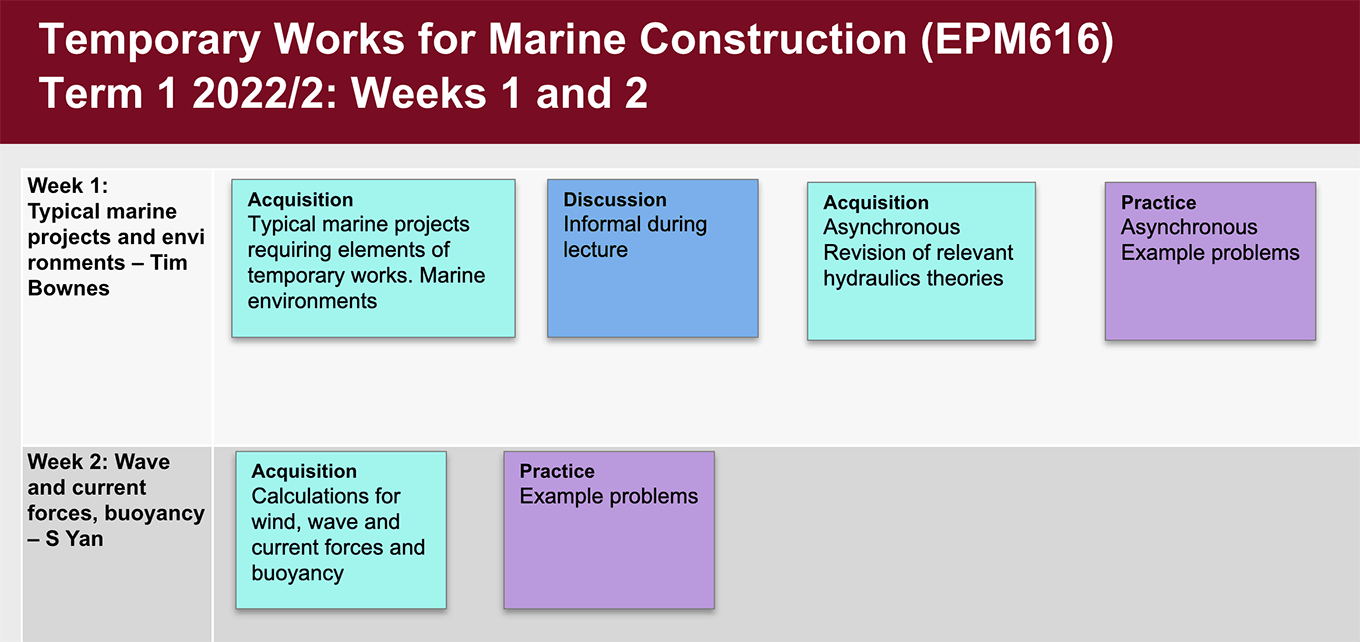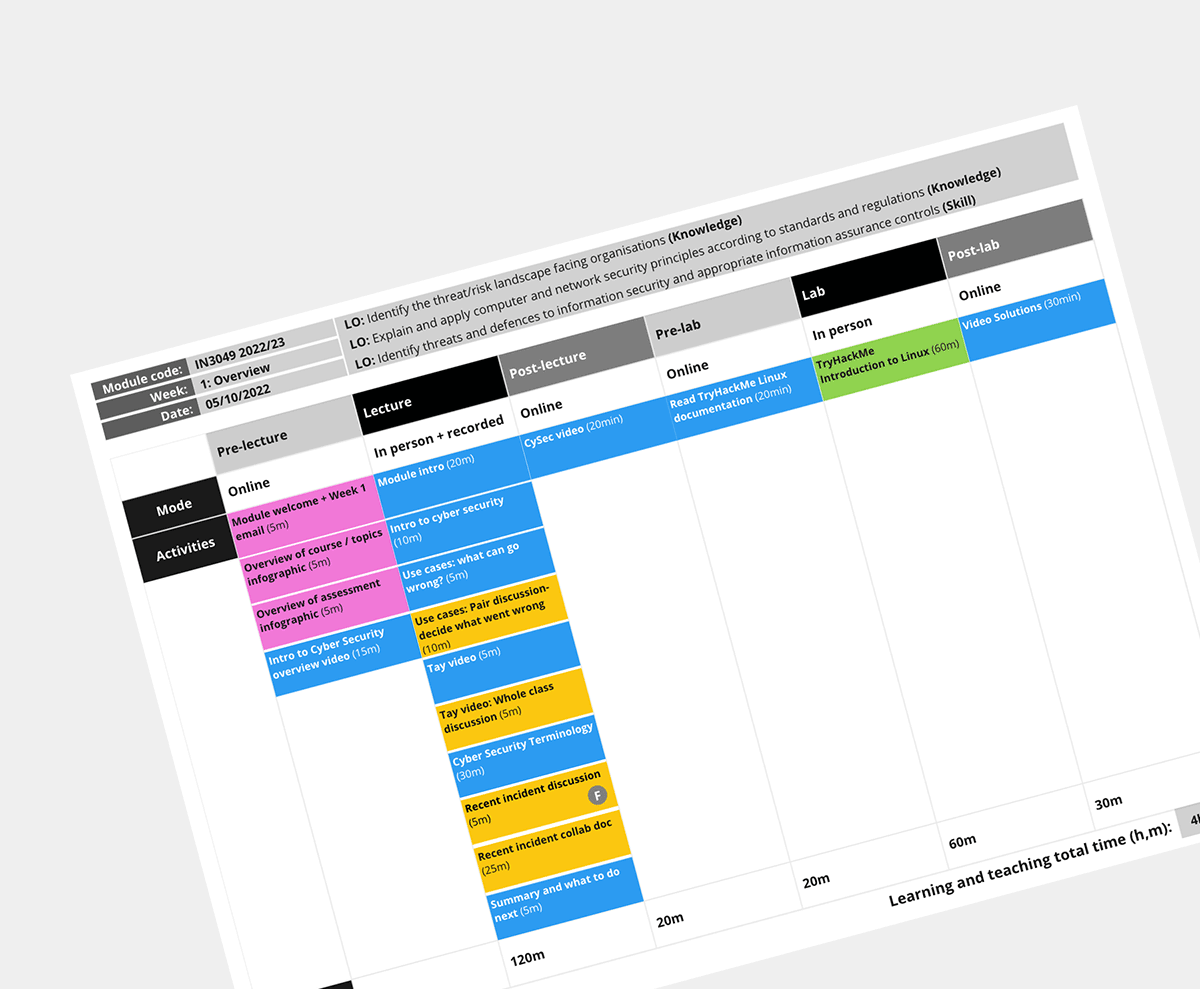LEaD’s Digital education team have been working with civil engineering academics to support them in re-designing a programme which changed from a blended to a fully online mode of delivery. The project ran from March 2021 to April 2023; this post covers how we worked with the programme team, from design to development to delivery and evaluation.
Contents
MSc Temporary Works and Construction Method Engineering
The MSc Temporary Works programme focuses on an essential aspect of most construction projects: constructing and removing temporary structures. The course was developed in response to commercial demand, and students are usually working professionals with at least two years of practical experience in construction. Over 20 industry experts deliver teaching, providing insights into current practice in temporary works and academics experienced in theories underlying the design methods used.
The programme ran in a blended mode for several years. In 2021, the programme’s academic team decided to change to entirely online to accommodate students working full-time across the UK or the world and to provide a more flexible mode of study. There are eight taught modules and a project with options to participate in some in-person activities such as site visits and a field course. Modules consist of guided independent learning and one day of online teaching per week over ten weeks.
Learning design and development
Two educational technologists, a learning designer and a project manager from LEaD’s digital education team worked with the MSc Temporary Works programme team. The main focus was reflecting on and re-thinking how to teach in a fully online mode. We aimed to address questions like:
- Given the high number of visiting lecturers, how can we create pedagogic consistency across modules?
- How can we make the learner experience clear and consistent throughout the programme?
The focus throughout the design of the programme’s modules has been on the student experience, facilitated through a consistent and rigorous learning design approach based on UCL’s ABC approach to learning design (Perović and Young, 2022). We used an adapted version of the ABC storyboarding approach to map out student activities week by week for each module. The intention was to ensure that there was a range of activity types for students to engage with, including knowledge acquisition, applying knowledge, developing skills and working collaboratively. As this phase took place during the pandemic, the storyboard was done online using PowerPoint:

Following the storyboard, we ran separate sessions to develop the storyboard ideas using a more detailed module plan:

We also worked with the programme team on developing a template for Moodle, which was used on all modules. There was a brief introductory video for each week of teaching and clear instructions to learners on independent study activities and assessments. Modules also used learning technologies such as Microsoft Teams, Kaltura Mediaspace, Poll Everywhere and Talis Reading Lists Online.
Case study video
We have put together this short (7 min) video which features the MSc Temporary works programme team talking through how they worked with LEaD:
Student feedback
Feedback from students informed the development of the programme during module delivery as we ran mid-module evaluations with students. We also ran an end of module student survey. Overall feedback on the online delivery mode was positive. There were high satisfaction ratings for teaching, including clarity of assessment expectations, quality of learning resources (including slides and videos), and authenticity of assessment. Additionally, despite work and location complexities, live sessions consistently had high attendance.
LEaD’s Digital Learning Design service
This project also served as a pilot for LEaD’s university-wide Digital Learning Design service. This service offers a collaborative, flexible process for designing, developing, and delivering effective blended and online learning programmes and modules.
If you have questions like:
- How can I improve student engagement in my programme/module?
- How can I design activities which give my students real-life practice and ways to apply their knowledge?
- How can I make my programme/module more inclusive?
- How can I add blended learning components or hybrid teaching to my programme/module?
…then please get in touch with Dom or Peter to discuss how LEaD can work with you:
Law, Bayes and SST
Dom Pates: dominic.pates.1@city.ac.uk
SHPS, SPGA and SCC
Peter Kogan: p.kogan@city.ac.uk
References
Butcher, C., Davies, C., Highton, M., 2020. Designing Learning: From Module Outline to Effective Teaching, 2nd ed. Routledge, New York. https://doi.org/10.4324/9780429463822
Perović, N., Young, C., 2022. UCL ABC Learning Design [WWW Document]. ABC Learning Design @ UCL. URL https://blogs.ucl.ac.uk/abc-ld/ (accessed 3.13.23).

